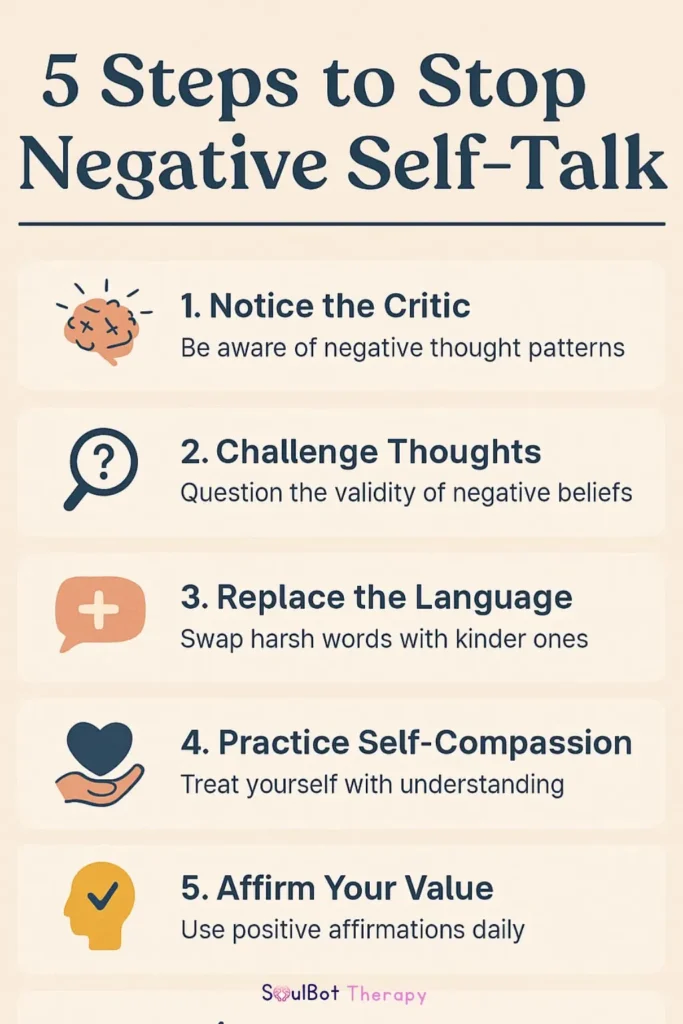Everyone has that voice that whispers, “You’re not good enough,” or “you’ll fail anyway.” But here’s the thing: negative self-talk isn’t just an annoying habit; it can damage self-esteem, fuel anxiety, and hold you back from growth. The good news? You can learn how to stop negative self-talk and actually believe in a kinder, more supportive inner dialogue.
🧠 Struggling with your inner critic? Take our MBTI Test and see where you stand.What Is Negative Self-Talk and Why Is It Harmful?
Negative self-talk is your inner critic running wild with distorted beliefs. It often comes from past experiences, stress, or cultural comparison. Left unchecked, it becomes a cycle that shapes how you see yourself.
📊 SoulFact: Research published by the APA shows that self-talk influences performance, stress levels, and physical health outcomes.
How Do You Recognize Negative Thought Patterns?
The first step to change is awareness. Negative self-talk often disguises itself in subtle ways, like:
- All-or-nothing thinking: “If I don’t do this perfectly, I fail.”
- Catastrophizing: “This small mistake will ruin everything.”
- Comparisons: “They’re so much better than I am.”
- Self-blame: “It’s always my fault.”
Naming these thought patterns is the first step in breaking negative thought patterns.
What Are the Best Techniques to Stop Negative Self-Talk?
Here’s how to break the cycle:
- Challenge your thoughts – Ask: “Is this fact or just fear?”
- Reframe the narrative – Swap “I can’t do this” with “I’ll give it my best shot.”
- Practice daily journaling – Write down distorted thoughts, then reframe them.
- Use self-compassion practices – Speak to yourself like you’d comfort a friend.
💡 Related SoulBot Read: How to Build Self-Esteem Without Toxic Positivity

How Can Positive Affirmations Actually Work (and Feel Real)?
Affirmations often get dismissed as cheesy, but when grounded in reality, they work. The key is believability. Instead of “I am perfect,” try:
- “I am learning to accept myself.”
- “I don’t need to be flawless to be worthy.”
📊 SoulFact: Positive affirmations activate brain areas linked to self-valuation and problem-solving, making them powerful tools for resilience.
What Role Do Self-Compassion Practices Play in Healing?
Self-compassion practices aren’t about ignoring flaws but responding with kindness instead of punishment. Techniques include:
- Placing a hand on your heart when self-criticism arises.
- Write letters of encouragement to yourself.
- Practicing guided meditations focused on compassion.
This reduces shame and creates space for growth.
Which Emotional Regulation Tools Help You Reframe Your Inner Critic?
Managing emotions is critical when your inner critic gets loud. Useful emotional regulation tools include:
- Breathing exercises to calm anxiety.
- Grounding techniques (like the 5-4-3-2-1 method).
- CBT-based thought logs to separate facts from feelings.
Over time, these tools weaken automatic negative spirals.
Can AI Mental Health Support Help You Overcome Negative Self-Talk?
Yes. While AI isn’t a replacement for therapy, tools like SoulBot can:
- Offer daily affirmations tailored to your mood.
- Guide you through reframing exercises.
- Track recurring thought patterns over time.
It’s like having a mental health companion that reminds you to treat yourself compassionately.
🔑 Final Thought
Learning to stop negative self-talk isn’t about silencing your inner voice but teaching it to be a better ally. With reframing, affirmations that feel real, and self-compassion practices, you can gradually quiet your critic and believe in yourself again.
💬 Chat with SoulBot, your AI mental health coach, for daily affirmations and thought reframing guidance.







